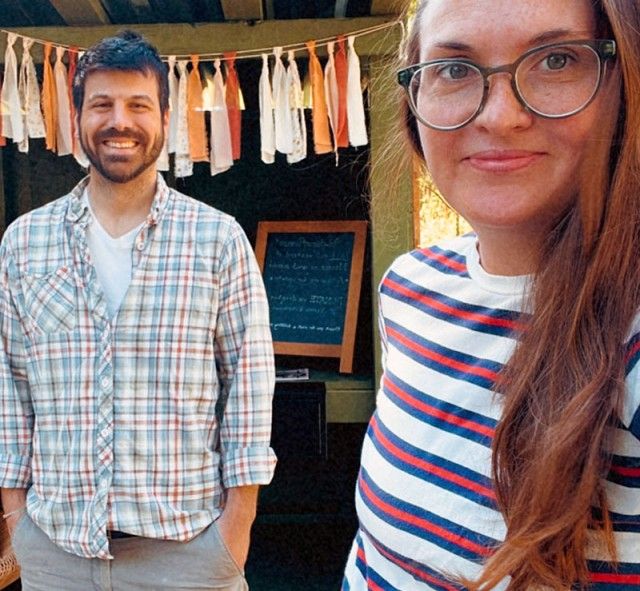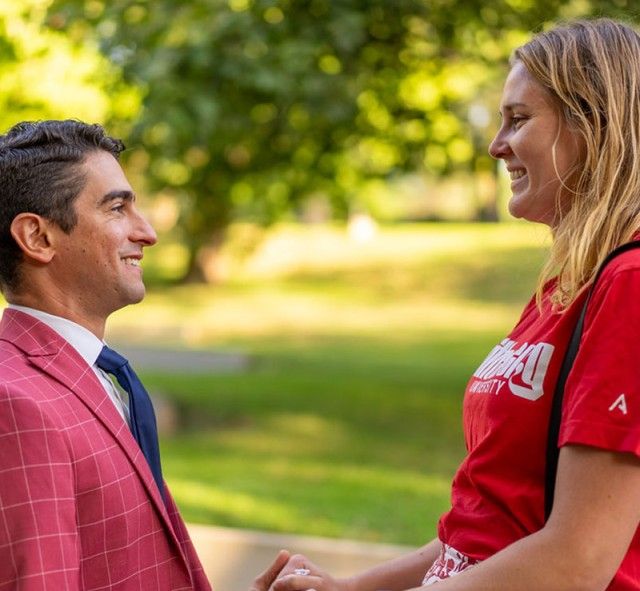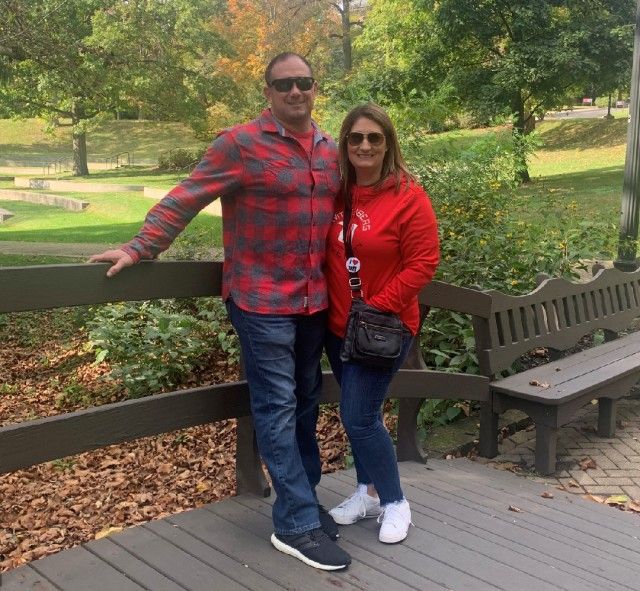Lily Pederson, class of 2024, serves as a testament to the quality of Wittenberg’s computer science/cybersecurity program.
A native of Springfield, Ohio, Pederson, who double majored in information systems and computer science with a concentration in cybersecurity, quickly secured a high-paying job well before graduation after attending a career fair hosted by Wright-Patterson Air Force Base.
“This job opportunity was pure happenstance. Information about the career fair was emailed to students in the math and computer science department,” she said. “Normally, I wouldn’t have gone to these types of events, but Wittenberg had arranged transportation for anyone who signed up. I managed to impress the Air Force Research Laboratory table with my resume, and, by the next day, I had an intent to hire letter in my hand.”
While the opportunity required her to move to Florida, Pederson welcomed the change and is now working at Eglin Air Force Base as an associate computer scientist with the Air Force Research Laboratory.
“My major in computer science helped me land both internships and jobs, including my current position. One of the best ways you can set yourself apart in such a competitive field is to get experience and get it early,” said Pederson, who was involved in the Wittenberg Programming Club, the Role-Playing Guild, and Kappa Delta sorority during her time at Wittenberg. She also studied abroad as part of the Witt in Wittenberg, Germany program in spring 2023.
“My first tech job was actually at Wittenberg’s Information Technology Services as a student worker,” she continued. “I gained valuable experience utilizing industry tools and procedures that helped expand my knowledge of the field. That allowed me to apply for more competitive internships and eventually culminated in my earning a full-time job at Eglin AFB. In general, the field of cybersecurity is very competitive, but there are also many opportunities for employment. Our lives are intertwined with technology that will only expand in the future. There will always be a need to protect digital assets and personal information.”
That worldwide need to protect digital assets is part of the reason why Pederson chose computer science and cybersecurity. The sophisticated theoretical knowledge, critical thinking, and problem-solving skills she gained through Wittenberg’s program also helped her tackle real-world issues in the areas of computer programming and cybersecurity.
“I chose to major in computer science because of my love of computers,” she said. “I’ve always been tech-savvy and curious about the way they worked. As for the cybersecurity aspect, I initially wanted to become an ethical hacker – a person hired by companies to hack into their systems to root out exploitable vulnerabilities so they can fix them before a malicious hacker exploits them. The reason I like cybersecurity is that I feel like I’m making a difference. I’m using my skills and knowledge to help protect data from people who would want to exploit it.”
Her job at Eglin AFB has been amazing so far.
“I could not have asked for a better group of people to work with,” Pederson said. “I’m learning a lot in my new role spanning a variety of topics. I’m also getting more involved at work. I’m now helping with a few projects and signed up to be an intern mentor during the summer.”
She was also able to attend a class about the Science of Test.
“One aspect included using statistics to help in debugging programs,” she said. “The class was about applying statistical analysis software to simulate an experiment and its potential results. With this information, decisions about running the actual experiment can be tailored to efficiency. It was a short, but fascinating class.”
While Pederson was excited for a change in environment, it was also scary because of her chronic illness.
“I have had Postural Orthostatic Tachycardia Syndrome or POTS since the age of 10, so the moving aspect was a bit daunting,” she said. “I’m moving away from my home and family to a new place and new environment. For me, the biggest adjustment will be working full-time within my limitations while juggling basic tasks like grocery shopping or laundry. Thankfully, I have an amazing support system from friends and family. The transition went smoothly. My mom played a big role in setting me up for success here. Work also made it easier because it helped me set a routine.”
Pederson is the daughter of the Elizabeth E. Powelson Endowed Chair in Biology Cathy Pederson, Wittenberg class of 1991, who has dedicated much of her research to the illness along with creating the Standing Up to Pots organization in 2014 to aid in research and help others in the fight against it.
“My POTS symptoms are more stable now than when I was in high school,” Lily said. “This is due to medication changes and increased levels of activity as I tried to negotiate college life. While I never feel particularly well, I’m able to do more (with accommodations) than I have in the past.
“I hope to feel better with this move to Florida. The weather really affects me in Ohio, and I am hoping that more stable weather patterns will release me from some of my symptoms,” she added. “POTS will always be a part of my life, but I have become better at managing my symptoms and stopping activities before I trigger a symptom flare.”
Because of her illness, Pederson often used the accessibility services that Wittenberg offers students, which allowed her to experience college to the best of her ability.
“The main service I used was medical escort. Although Wittenberg’s campus is beautiful, I cannot walk up the hill where classes are held,” she said. “Instead, I called Witt police to drive me to my classes. I also used them if there was an evening event on campus. This allowed me to attend classes and events without expending unnecessary energy. I will admit that I was initially against using this service for fear of being different. I desperately wanted to fit in as college was my fresh start. So, my freshman self stubbornly decided to just walk to classes instead. That lasted about three days. I realized that my desire to fit in wasn’t worth the toll it was taking on my health.”
Pederson also used exam accommodations regularly and was impressed with how professors worked with all the campus services to make sure her needs were addressed.
“My accommodation included time and a half and a separate quiet testing room for any exams or quizzes because some of my symptoms include brain fog and noise sensitivity,” she said. “With these accommodations, I could dedicate my all to the test/quiz without worrying that brain fog or sudden noise would break my train of thought. All my professors were extremely accommodating and worked with the accessibility program to ensure I had all the tools I needed to succeed.
“The best advice I can give to future students is to use the accommodations to the fullest. The accommodations are tools to allow you to succeed. If something isn’t working, meet with accessibility services, and they will work alongside you to figure out a solution.”







